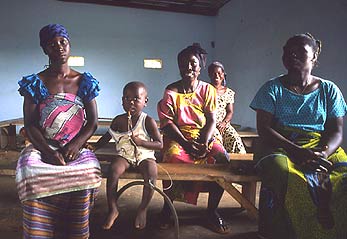UNHCR plans to evacuate refugees in western Côte d'Ivoire as conflict spreads
UNHCR plans to evacuate refugees in western Côte d'Ivoire as conflict spreads

DANANE, Côte d'Ivoire, December 9 (UNHCR) - The UN refugee agency is making plans to evacuate thousands of refugees from western Côte d'Ivoire, where rebel fighting is spreading and causing an exodus from the country.
Over the weekend, some 6,000 more people fled troubled western Côte d'Ivoire for neighbouring countries, bringing the total to at least 36,000 since fighting erupted there on November 28.
Among those registered at crossing points in Liberia were more than 10,000 Ivorians, as well as over 22,000 Liberians who had been living in the so-called "Zone d'Accueil des Réfugiés" (ZAR, or refugee-hosting area) in western Côte d'Ivoire. They were forced back into Liberia by the fighting and the fear of being drawn into the conflict or stigmatised as English-speakers and alleged supporters of the rebels.
Another 4,000 people have fled into Guinea since last week.
Amid conflicting reports about the military situation around western towns of Côte d'Ivoire, UNHCR has been unable to regain contact with some 45,000 Liberian refugees living in the area. Some of them may have been among those who crossed into Liberia, but there are still many who remain at risk.
The refugee agency is urgently looking at the feasibility of various options to evacuate thousands of refugees from western Côte d'Ivoire, including emergency repatriation to Liberia and/or temporary settlement in a third West African country.
On Sunday, plans to evacuate refugees from the fighting zone suffered a major setback when a UNHCR ferry near Tabou, in the south, was seriously damaged by hand grenades detonated by loyalist forces, supposedly to prevent alleged Liberian rebels from moving in and out of Liberia.
The town of Guiglo was also reportedly deserted last weekend after rebels announced they had captured Blolequin, east of Toulépleu, and were reportedly advancing east towards Guiglo, some 120 km east of Toulépleu. Reports indicate that more refugees living in the region are fleeing towards Nicla camp, near Guiglo, in search of safety.
There are fears that the outflow - the ZAR hosts a total of 72,000 mostly Liberian refugees - towards Liberia could increase further should the rebels continue their advance towards the south.
For security reasons, UNHCR has temporarily closed its office in Guiglo and recalled its staff to safer locations in Côte d'Ivoire.
As the situation remains extremely volatile, an increasing number of Ivorian nationals may be forced to run to safety in Liberia or Guinea. Already, there has been a noticeable increase in the number of Ivorian nationals among those crossing into Liberia in recent days.
Most of the new Ivorian refugees are being hosted in local communities near the border, staying either with relatives or host families. A small number of them have opted to be transferred to one of the three transit centres that UNHCR is running along the border, in Nimba, Grand Geddeh and Mariland counties. The refugee agency is presently discussing the possibility of transforming these temporary transit centres into more permanent camps to cater for the current and future arrivals.
Liberian refugees and nationals who had been living in the Danané and Toulépleu areas have, for the most part, asked to be assisted to return to their regions of origin. UNHCR has set up a major trucking operation involving 23 trucks to transport people, in often difficult road conditions, to drop-off points in Monrovia and other towns in the interior of Liberia.
"Crossing the border is also becoming harder by the day as fighting gets more brutal," reported Moses Okello, UNHCR Representative in Liberia.
In addition to 13 staff already redeployed to present hotspots from within the region, the refugee agency is sending seven new emergency specialists from outside the region to Côte d'Ivoire, Liberia and Ghana this week.
UNHCR is also waiting for funds to airlift 25,000 blankets, 2,500 cooking sets and four light vehicles to support the existing stocks in the Liberian capital of Monrovia. A ship with 20,000 blankets and other domestic items such as cooking sets, jerry cans, plastic sheeting and plastic rolls has already left Hamburg for the agency's regional stockpiles in Accra, Ghana. Another ship is due to leave soon from London with a donation from the British government.
To date, UNHCR has received a limited response to its emergency appeal for $6.1 million for West Africa. The agency's budget for the region is already stretched to the limit by the ongoing Sierra Leone repatriation and reintegration programme and the outflow of more than 90,000 Liberian refugees to neighbouring countries in 2002.
"We are now running three different special operations in this part of West Africa," said David Lambo, UNHCR Africa Director. "If the crisis worsens, we will certainly need 20 to 30 more trucks in the region."








